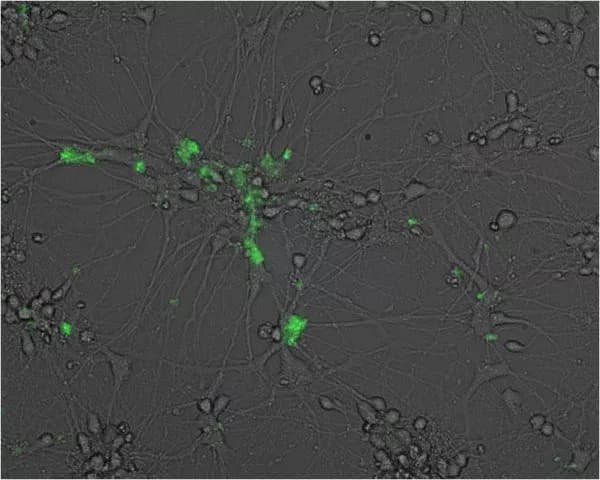For years, researchers have noted a tantalizing link between some neurologic conditions and certain species of the herpes virus. In patients with Alzheimer's disease, multiple sclerosis, and cerebellar ataxia, among other neuropathies, the cerebrospinal fluid teems with Epstein-Barr virus (EBV). Yet, the nature of that link has remained unclear, as it has been assumed that EBV, as well as other viruses in the same sub-family, called gammaherpesviruses, cannot infect neurons.
Now, thanks to investigators from the Perelman School of Medicine at the University of Pennsylvania, researchers in this field know better. Erle S. Robertson, PhD, a professor of Microbiology and Otorhinolaryngology and Director of the Tumor Virology Training Program at the Abramson Cancer Center, and colleagues published in mBio this week that EBV and a related virus, Kaposi's sarcoma-associated herpesvirus (KSHV), can infect and replicate in both cultured and primary neurons.
Though by no means proving causality, those data do suggest viral infection could underlie at least some of the symptoms of those brain disorders, as well as the potential utility of antiviral drugs as a novel therapeutic strategy.
According to Robertson, several lines of evidence suggested the possibility that gammaherpesviruses could infect brain tissue. First, the viruses are enriched in the cerebrospinal fluid and brain tissue of individuals with such conditions as multiple sclerosis (MS) and Alzheimer's disease. In addition, individuals with a history of infectious mononucleosis caused by EBV are more likely to develop MS, while those who have never been infected with EBV are less likely to do so. Particularly tellingly, the drug acyclovir, which can inhibit EBV and related viruses, has been examined as a potential treatment for MS, with some positive, albeit inconclusive, results.
Still, says Robertson, the ability of gammaherpesviruses to infect neurons has been "controversial." Devan Mehta, a student in Robertson's lab, working with postdoctoral fellow Hem C. Jha, PhD, and Dennis Kolson, MD, PhD, a professor of Neurology, tested the link directly. Using genetically modified viruses that express green fluorescent protein (GFP), Mehta infected human neuroblastoma cells (neurons differentiated from cancer cells) and primary human fetal neurons, monitoring the infection over time by microscopy and protein expression.
In both cell types, infection with either EBV or KSHV resulted in the appearance of a fluorescent signal in the infected cells, as well as the appearance of key viral proteins. The media in which infected cells were grown also contained functional virus particles capable of infecting other cells, indicating a mode of infection that tears open host cells. On the other hand, treatment of infected cells with acyclovir reduced the production of virus particles.
"I couldn't believe it," Robertson said. "After 50 years of studying EBV, nobody had ever seen the virus in nerve cells. But maybe they just never looked."
According to Robertson, these data suggest that viral infection of neurons could be associated with neuropathology, though he emphasizes that it is not the same as establishing causality. Such proof, if it ever comes, could be years away.
"There's likely to be association of this virus with neurons," he stated. "But more studies will be necessary to know whether it is actually associated with disease pathology.
Why EBV and KSHV infection of neurons results in a specific destructive form of infection will also be explored in future research. In contrast, when these viruses infect other cell types, such as B cells, they enter a latent mode, in which virus particles are relatively dormant. But, when they infect neurons, the particles apparently direct the cells to produce large amounts of virus, burst, and die, which explains why the growth media bathing infected cells could be used to infect other cells. "That's an interesting twist," Robertson said.
If nothing else, the ability of gammaherpesviruses to infect neurons provides a new model system for studying viral life cycles. But these viruses ultimately may also prove useful in studying disease etiology. "If you can infect nerve cells, that's likely to have some sort of pathology," he said.
The above post is a redistributed news release provided by the Perelman School of Medicine at the University of Pennsylvania. Note: Materials may be edited for content and length.
Disclaimer: DoveMed is not responsible for the adapted accuracy of news releases posted to DoveMed by contributing universities and institutions.
Related Articles
Test Your Knowledge
Asked by users
Related Centers
Related Specialties
Related Physicians
Related Procedures
Related Resources
Join DoveHubs
and connect with fellow professionals


0 Comments
Please log in to post a comment.